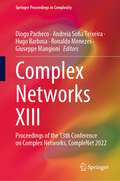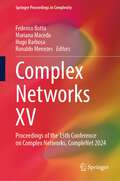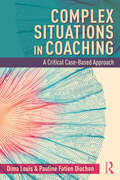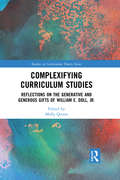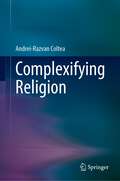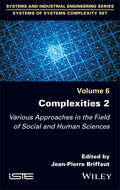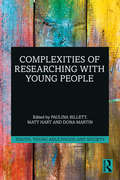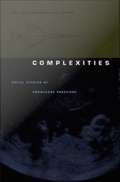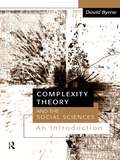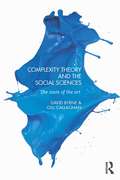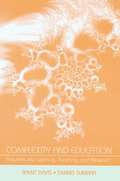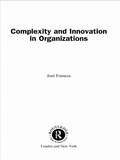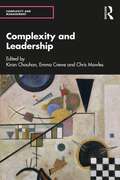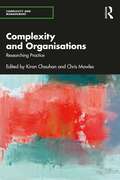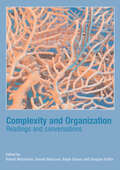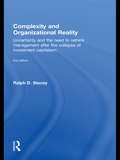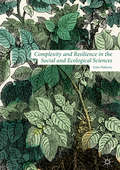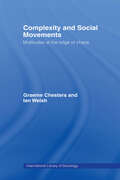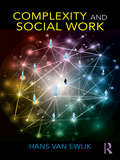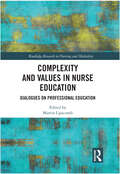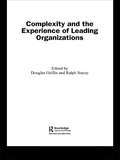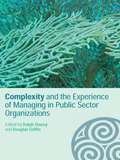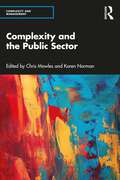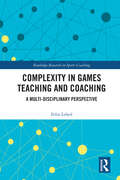- Table View
- List View
Complex Networks XIII: Proceedings of the 13th Conference on Complex Networks, CompleNet 2022 (Springer Proceedings in Complexity)
by Ronaldo Menezes Giuseppe Mangioni Hugo Barbosa Andreia Sofia Teixeira Diogo PachecoThis book contains contributions presented at the 13th International Conference on Complex Networks (CompleNet), April 19–22, 2022. CompleNet is an international conference on complex networks that brings together researchers and practitioners from diverse disciplines—from sociology, biology, physics, and computer science—who share a passion to better understand the interdependencies within and across systems. CompleNet is a venue to discuss ideas and findings about all types of networks, from biological to technological and to informational and social. It is this interdisciplinary nature of complex networks that CompleNet aims to explore and celebrate.
Complex Networks XV: Proceedings of the 15th Conference on Complex Networks, CompleNet 2024 (Springer Proceedings in Complexity)
by Ronaldo Menezes Hugo Barbosa Federico Botta Mariana MacedoThe International Conference on Complex Networks (CompleNet) brings together researchers and practitioners from diverse disciplines working on areas related to complex networks. CompleNet has been an active conference since 2009. Over the past two decades, we have witnessed an exponential increase in the number of publications and research centres dedicated to this field of Complex Networks (aka Network Science). From biological systems to computer science, from technical to informational networks, and from economic to social systems, complex networks are becoming pervasive for dozens of applications. It is the interdisciplinary nature of complex networks that CompleNet aims to capture and celebrate. The CompleNet conference is one of the most cherished events by scientists in our field. Maybe it is because of its motivating format, consisting of plenary sessions (no parallel sessions); or perhaps the reason is that it finds the perfect balance between young and senior participation, a balance in the demographics of the presenters, or perhaps it is just the quality of the work presented.
Complex Situations in Coaching: A Critical Case-Based Approach
by Dima Louis Pauline Fatien DiochonComplex Situations in Coaching is a collection of 20 typical yet underdiscussed issues in coaching, ranging from value conflicts, multiple agendas, power dynamics, and emotion management, to the role of money, etc. Organized into ten chapters, they are positioned into the literature and commented on by world-class coaches, coaching researchers, educators, and program directors. This plurality of voices is designed to foster dialogue, questions, and solutions; this setting, supportive of reflexivity, critical thinking, and diversity awareness, is essential to the development and education of coaches in an increasingly complex world where ready-made solutions prove limited. Thus, beyond a 'toolkit approach', this book engages in a thought-provoking and multi-perspective journey in support of the professionalization and continuous education of coaches, instructors, and/or supervisors.
Complexifying Curriculum Studies: Reflections on the Generative and Generous Gifts of William E. Doll, Jr. (Studies in Curriculum Theory Series)
by Molly QuinnThe essays in this volume bring together leading-edge scholars to illuminate the work of William E. Doll, Jr., as a key curriculum thinker of global impact, and introduce his work and influence to new generations of scholars, teachers, and students of education. Drawing on their individual contexts, contributors cover a range of topics and themes, including engagement with pragmatism, the work of John Dewey, and the inclusion of post-modern, chaos, and complexity theories to education and curriculum. Advancing our understanding and conversation of existing problems and possibilities in education, this collection serves as both an homage to Doll and a call for action and consideration of what matters in education.
Complexifying Religion
by Andrei-Razvan ColteaThis book provides an original and challenging perspective of religions as abstract complex adaptive systems, using an interdisciplinary approach to try to understand what religions are and how they function, two fundamental issues which, despite an intense struggle from several fields, have not yet been resolved. What is the source of religious belief? How do religions work and what are they made of? Why is religion so important for us that it has survived centuries of scientific progress and secularization? Why are people religious even outside religion? The book addresses these questions using an interdisciplinary approach that seeks to untangle the Gordian knot of defining religion. In short, they can be considered entropy-reducing technologies. What differentiates them from other meaning-producing systems is their configuration which employs specific building blocks as tools for mitigating entropy, which are also subsystems and combine in various ways to build a unique configuration: rituals, myths, taboos, supernatural agents, authority, identity, superstitions, moral obligations, afterlife beliefs and the sacred. As a reaction to perturbances or pressure, systems can collapse. Inspired by Nicholas Nassim Taleb, it is, in this book, referred to as fragility—the negative reaction of systems to random events, and four parameters can be used to evaluate it in religious systems: monotonicity (the inability to learn from past mistakes), coupling (linking with other systems: such as political or economic), centralization and stress starvation. Several case studies are provided in order to test the theoretical claims made in this book, based on the author's field research in Romania, Japan, North Korea and Mongolia, and offering details that could be of interest to casual readers, students and researchers of religion.
Complexities 2: Various Approaches in the Field of Social and Human Sciences
by Jean-Pierre Briffaut Daniel KrobAwareness of complexity in science and technology dates back to the 1970s. However, all social systems tend to develop structures that become more complex over time, be it within families, tribes, cities, states, or societal and economic organizations. Complexities 2 covers a broad array of fields, from justice and linguistics to education and organizational management. The aim of this book is to show, without aiming to provide a comprehensive overview, the diversity of approaches and behaviors towards the obstacle of complexity in understanding and achieving human actions. When we see complexity as the incompleteness of knowledge and the uncertainty of the future, we realize that simplifying is not an adequate approach to complexity, even in the humanities and social sciences. This book explores the relationship between order and disorder in this field of knowledge.
Complexities of Researching with Young People (Youth, Young Adulthood and Society)
by Paulina Billett Matt Hart Dona MartinCurrently, most books on youth research available on the market focus on ‘how to’ conduct youth research or the research process itself. This edited collection proposes to take this process a step further and discuss the complexities of youth research from a practical and theoretical context.In total, five themes are examined – conceptualising young people, ethics and consent, the digital, voice, participation and unexpected tensions. In this book, authors from six countries explore the complexities of researching with young people across disciplines and national contexts.Offering a closeup examination of their own research experiences, the authors address the complexities of researching with young people beyond simple questions of protection from harm and coercion by problematising notions of ‘resilience’, ‘participation’, ‘risk’ and ‘voice’. This edited collection takes the reader through an exploration of its key themes and, in doing so, presents a cast of candid and insightful accounts from youth researchers situated within the humanities and social sciences.
Complexities: Social Studies of Knowledge Practices
by John Law Annemarie MolAlthough much recent social science and humanities work has been a revolt against simplification, this volume explores the contrast between simplicity and complexity to reveal that this dichotomy, itself, is too simplistic. John Law and Annemarie Mol have gathered a distinguished panel of contributors to offer--particularly within the field of science studies--approaches to a theory of complexity, and at the same time a theoretical introduction to the topic. Indeed, they examine not only ways of relating to complexity but complexity in practice. Individual essays study complexity from a variety of perspectives, addressing market behavior, medical interventions, aeronautical design, the governing of supranational states, ecology, roadbuilding, meteorology, the science of complexity itself, and the psychology of childhood trauma. Other topics include complex wholes (holism) in the sciences, moral complexity in seemingly amoral endeavors, and issues relating to the protection of African elephants. With a focus on such concepts as multiplicity, partial connections, and ebbs and flows, the collection includes narratives from Kenya, Great Britain, Papua New Guinea, the Netherlands, France, and the meetings of the European Commission, written by anthropologists, economists, philosophers, psychologists, sociologists, and scholars of science, technology, and society. Contributors. Andrew Barry, Steven D. Brown, Michel Callon, Chunglin Kwa, John Law, Nick Lee, Annemarie Mol, Marilyn Strathern, Laurent Thévenot, Charis Thompson
Complexity Theory and the Social Sciences: An Introduction
by David ByrneChaos and complexity are the new buzz words in both science and contemporary society. The ideas they represent have enormous implications for the way we understand and engage with the world. Complexity Theory and the Social Sciences introduces students to the central ideas which surround the chaos/complexity theories. It discusses key concepts before using them as a way of investigating the nature of social research. By applying them to such familiar topics as urban studies, education and health, David Byrne allows readers new to the subject to appreciate the contribution which complexity theory can make to social research and to illuminating the crucial social issues of our day.
Complexity Theory and the Social Sciences: The state of the art
by David Byrne Gillian CallaghanFor the past two decades, ‘complexity’ has informed a range of work across the social sciences. There are diverse schools of complexity thinking, and authors have used these ideas in a multiplicity of ways, from health inequalities to the organization of large scale firms. Some understand complexity as emergence from the rule-based interactions of simple agents and explore it through agent-based modelling. Others argue against such ‘restricted complexity’ and for the development of case-based narratives deploying a much wider set of approaches and techniques. Major social theorists have been reinterpreted through a complexity lens and the whole methodological programme of the social sciences has been recast in complexity terms. In four parts, this book seeks to establish ‘the state of the art’ of complexity-informed social science as it stands now, examining: the key issues in complexity theory the implications of complexity theory for social theory the methodology and methods of complexity theory complexity within disciplines and fields. It also points ways forward towards a complexity-informed social science for the twenty-first century, investigating the argument for a post-disciplinary, ‘open’ social science. Byrne and Callaghan consider how this might be developed as a programme of teaching and research within social science. This book will be particularly relevant for, and interesting to, students and scholars of social research methods, social theory, business and organization studies, health, education, urban studies and development studies.
Complexity and Education: Inquiries Into Learning, Teaching, and Research
by Brent Davis Dennis SumaraThis book explores the contributions, actual and potential, of complexity thinking to educational research and practice. While its focus is on the theoretical premises and the methodology, not specific applications, the aim is pragmatic--to present complexity thinking as an important and appropriate attitude for educators and educational researchers. Part I is concerned with global issues around complexity thinking, as read through an educational lens. Part II cites a diversity of practices and studies that are either explicitly informed by or that might be aligned with complexity research, and offers focused and practiced advice for structuring projects in ways that are consistent with complexity thinking. Complexity thinking offers a powerful alternative to the linear, reductionist approaches to inquiry that have dominated the sciences for hundreds of years and educational research for more than a century. It has captured the attention of many researchers whose studies reach across traditional disciplinary boundaries to investigate phenomena such as: How does the brain work? What is consciousness? What is intelligence? What is the role of emergent technologies in shaping personalities and possibilities? How do social collectives work? What is knowledge? Complexity research posits that a deep similarity among these phenomena is that each points toward some sort of system that learns. The authors’ intent is not to offer a complete account of the relevance of complexity thinking to education, not to prescribe and delimit, but to challenge readers to examine their own assumptions and theoretical commitments--whether anchored by commonsense, classical thought or any of the posts (such as postmodernism, poststructuralism, postcolonialism, postpositivism, postformalism, postepistemology) that mark the edges of current discursive possibility. Complexity and Education is THE introduction to the emerging field of complexity thinking for the education community. It is specifically relevant for educational researchers, graduate students, and inquiry-oriented teacher practitioners.
Complexity and Innovation in Organizations
by Jose FonsecaTaking a critical look at major perspectives on innovation, this book suggests that innovation is not a designed functional activity of a firm or an intentional process through which firms anticipate changes in conditions. Jose Fonseca proposes that the concepts behind the innovation experiences cannot be traced to any particular time, space
Complexity and Leadership (Complexity and Management)
by Emma Crewe Chris Mowles Kiran ChauhanLeading organisations in our contemporary world means grappling with unpredictability, painful pressures and continual conflict, all in the context of an acceleration in the pace of change. We expect the impossible from heroic leaders and they rarely live up to expectations. With countless recommendations, self-help books and new concepts, scholars and management consultants often simplify and dream unrealistically. This book challenges the more orthodox discourse on leadership and presents a way of thinking about leadership that pays closer attention to experience. The contributors in this book, all senior managers or facilitators of leadership development, resist easy solutions, new typologies or unrealistic prescriptions. Writing about their experiences in Denmark, the UK, Israel, Ethiopia, South Africa and beyond, they are less concerned with traits that people can possess and learn, or magical promises of recipes for success, and more with the socio-political process of the interaction between people from which leadership emerges as a theme. We focus on understanding leadership as a practice within which communication, research, imagination and ethical judgements are continuously improvised. So rather than idealising leadership, or reducing it to soothing tools and techniques, we suggest how leaders might become more politically, emotionally and socially savvy. This book is written for academics and practitioners with an interest in the everyday challenges of both individual and group practices of formal and informal leaders in different types of organisations, and is an ideal resource for executives and students on leadership development programmes. We hope this volume will help readers to expand the wisdom found in their own experience and discover for themselves and for others, a greater sense of freedom.
Complexity and Leadership (Complexity and Management)
by Emma Crewe Chris Mowles Kiran ChauhanLeading organisations in our contemporary world means grappling with unpredictability, painful pressures and continual conflict, all in the context of an acceleration in the pace of change. We expect the impossible from heroic leaders and they rarely live up to expectations. With countless recommendations, self-help books and new concepts, scholars and management consultants often simplify and dream unrealistically. This book challenges the more orthodox discourse on leadership and presents a way of thinking about leadership that pays closer attention to experience.The contributors in this book, all senior managers or facilitators of leadership development, resist easy solutions, new typologies or unrealistic prescriptions. Writing about their experiences in Denmark, the UK, Israel, Ethiopia, South Africa and beyond, they are less concerned with traits that people can possess and learn, or magical promises of recipes for success, and more with the socio-political process of the interaction between people from which leadership emerges as a theme. We focus on understanding leadership as a practice within which communication, research, imagination and ethical judgements are continuously improvised. So rather than idealising leadership, or reducing it to soothing tools and techniques, we suggest how leaders might become more politically, emotionally and socially savvy. This book is written for academics and practitioners with an interest in the everyday challenges of both individual and group practices of formal and informal leaders in different types of organisations, and is an ideal resource for executives and students on leadership development programmes. We hope this volume will help readers to expand the wisdom found in their own experience and discover for themselves and for others, a greater sense of freedom.
Complexity and Organisations: Researching Practice (Complexity and Management)
by Chris Mowles Kiran ChauhanVirtually everyone accepts that workplaces are complex, but there is little insight into how we might engage with complexity more skilfully. If complexity isn’t something that managers can control and leaders cannot harness, then what does a complexity perspective offer?This fourth book in the complexity series describes how taking complexity seriously can inform approaches to understanding organisations. It focuses on the ways that managers and researchers can engage with their own histories to better understand their working lives, how they may be participating in maintaining the very processes they are trying to change and how research methods can shed light on politics of working together. The chapter authors work in a wide variety of sectors and draw on their experience to produce vibrant writing which will resonate with managers and leaders who want to explore how they might understand their working lives differently, and to students who are using first-person reflexive research methodologies.Drawn from contemporary research in a wide variety of organisations, this book makes a valuable contribution to manager-researchers wanting to think differently about their intractable and enduring everyday dilemmas.
Complexity and Organization: Readings and Conversations (Complexity And Emergence In Organisations Ser.)
by Douglas Griffin Robert MacIntosh Donald MacLean Ralph StaceyIn the past decade, complexity-based thinking has exerted an increasing, yet somewhat controversial authority over management theory and practice. This has in some part been due to the influence of a number of high-profile articles and the not inconsiderable hype which has accompanied them. Another feature of the subject’s development has been the diversity of the origins of the thinking and the claims which have been made for it in terms of managerial and organizational implications. Complexity and Organization is the first text to bring this thinking together, presenting some of the most influential writing in the field, showing how the subject has developed and how it continues to influence managerial thinking. Seminal contributions to the field have been brought together in a single accessible volume, allowing readers to access what might otherwise appear a very diverse body of literature. Moreover, the editors, who represent some of the leading thinkers and writers in this field, have combined these readings with a unique commentary, indicating not only the importance of the papers but teasing out the subtle but significant differences and similarities between them. These commentaries take the form of a discussion between the editors, debating the contribution that each paper has made to the field and the influence it has had on management thinking.
Complexity and Organizational Reality: Uncertainty and the Need to Rethink Management after the Collapse of Investment Capitalism
by Ralph D. StaceyApproaches to leadership and management are still dominated by prescriptions - usually claimed as scientific - for top executives to choose the future direction of their organization. The global financial recession and the collapse of investment capitalism (surely not planned by anyone) make it quite clear that top executives are simply not able to choose future directions. Despite this, current management literature mostly continues to avoid the obvious - management's inability to predict or control what will happen in the future. The key question now must be how we are to think about management if we take the uncertainty of organizational life seriously. Ralph Stacey has turned to the sciences of uncertainty and complexity to develop an understanding of leadership and management as the ordinary politics of daily organizational life. In presenting organizations as a series of complex responsive processes, Stacey's new book helps us to see organizational reality for what it actually is - human beings engaged in many, many local conversational interactions and power relations in which they negotiate their ideologically based choices. Organizational continuity and change emerge unpredictably, rather than as a result of any overall plan. This is a radically different picture from the one painted by most of the management literature, which explains "organizational continuity and change" as the realization of the global plans and choices of a few powerful executives within an organization. Providing a new foundation for understanding complexity and management, this important book is required reading for managers and leaders wanting to understand the reality of complexity in organizations, including those engaged in postgraduate studies in leadership, organizational behaviour and change management.
Complexity and Resilience in the Social and Ecological Sciences
by Eoin FlahertyThis book introduces a new approach to environmental sociology, by integrating complexity-informed social science, Marxian ecological theory, and resilience-based human ecology. It argues that sociologists have largely ignored developments in ecology which move beyond functionalist approaches to systems analysis, and as a result, environmental sociology has failed to capitalise not only on the analytical promise of resilience ecology, but on complementary developments in complexity theory. By tracing the origins and discussing current developments in each of these areas, it offers several paths to interdisciplinary dialogue. Eoin Flaherty argues that complexity theory and Marxian ecology can enhance our understanding of the social aspect of social-ecological systems, whilst a resilience approach can sharpen the analytical power of environmental sociology.
Complexity and Social Movements: Multitudes at the Edge of Chaos (International Library of Sociology)
by Graeme Chesters Ian WelshFusing two key concerns of contemporary sociology: globalization and its discontents, and the 'complexity turn' in social theory, authors Chesters and Welsh utilize complexity theory to analyze the shifting constellation of social movement networks that constitute opposition to neo-liberal globalization. They explore how seemingly chaotic and highly differentiated social actors interacting globally through computer mediated communications, face-to-face gatherings and protests constitute a 'multitude' not easily grasped through established models of social and political change.Drawing upon extensive empirical research and utilizing concepts drawn from the natural and social sciences this book suggests a framework for understanding mobilization, identity formation and information flows in global social movements operating within complex societies. It suggests that this 'movement of movements' exhibits an emergent order on the edge of chaos, a turbulence that is recasting political agency in the twenty-first century.
Complexity and Social Work
by Hans Van EwijkBeing socially competent is essential in late modern society. We expect people to find their own accommodation, partner, job, community and lifestyle and struggle to find answers for those who are not able or do not have the opportunity to achieve these things. By placing social complexity, social vulnerability and social efficacy within a framework of social policy and social practice, Complexity and Social Work argues that growing social complexity excludes more and more citizens from social participation. The book starts with exploring complexity, super-diversity, vulnerability and social efficacy. From there the book deals with the discourses of social policy, social work and social work research, pledging for social policy aiming at desired outcomes, for generic contextual social work, and for a research practice that recognises practical wisdom. Aimed at final year undergraduates, postgraduates, professionals, trainers and lecturers involved in social work, social policy, social care, mental health and allied fields who are committed to treating socially vulnerable people with respect and acceptance, this book, the first of its kind, offers new perspectives on social complexity for practice, theory and research in human services.
Complexity and Values in Nurse Education: Dialogues on Professional Education (Routledge Research in Nursing and Midwifery)
by Martin LipscombThis work explores the interplay of complexity and values in nurse education from a variety of vantages. Contributors, who come from a range of international and disciplinary backgrounds, critically engage important and problematic topics that are under-investigated elsewhere. Taking an innovative approach each chapter is followed by one or more responses and, on occasion, a reply to responses. This novel dialogic feature of the work tests, animates, and enriches the arguments being presented. Thought-provoking, challenging and occasionally rumbustious in tone, this volume has something to say to both nurse educators (who may find cherished practices questioned) and students. Given the breadth and nature of subjects covered, the book will also appeal to anyone concerned about and interested in nursing’s professional development/trajectory.
Complexity and the Experience of Leading Organizations (Complexity as the Experience of Organizing)
by Douglas Griffin Ralph StaceyThe contributors to this book are leaders, consultants or managers in organizations who provide narrative accounts of their actual work and daily experience. They explore how the perspective of complex responsive processes assists them to make sense of their experience and so to develop their practice. Offering a different method of making sense of an individual’s experience in a rapidly changing world, this book uses reflective accounts of ordinary everyday life in organizations rather than idealized accounts. The editors’ commentary introduces and contextualizes these experiences as well as drawing out key themes for further research.
Complexity and the Experience of Managing in Public Sector Organizations (Complexity as the Experience of Organizing)
by Douglas Griffin Ralph StaceyA fundamental problem of public sector governance relates to the very way of thinking it reflects; where organization is thought of as a ‘thing’, a system designed to deliver what its designers choose. This volume questions that way of thinking and takes a perspective in which organizations are complex responsive processes of relating between people. Bringing together the work of participants on the Doctor of Management program at Hertfordshire University, this book focuses on the move to marketization and managerialism, paying particular attention to human relationships and group dynamics. The contributors provide narrative accounts of their work addressing questions of management, pressures, accountability, responsiveness and traditional systems perspectives. In considering such questions in terms of their daily experience, they explore how the perspective of complex responsive processes assists them in making sense of experience and developing practice. Including an editors’ commentary which introduces and contextualizes these experiences as well as drawing out key themes for further research, this book will be of value to academics, students and practitioners looking for reflective accounts of real life experiences rather than further prescriptions of what organizational life ought to be.
Complexity and the Public Sector (Complexity and Management)
by Chris Mowles Karen NormanSince the early 1990s, public sector organisations have been overwhelmed with what has come to be termed New Public Management (NPM) methods. NPM idealises performance, metrics, transparency and marketisation. This book explores some of the tensions which arise in institutions where NPM methods prevail, introduces different ways of thinking about the task of managing for public good and offers a radical challenge to the dominant assumptions regarding why and how professional communities of practice may (or may not) come to change their working practices. In this third book in the Complexity and Management series, the expert authors bring together their experiences to provide vibrant accounts of how to manage in everyday public sector organisational situations using practical judgement. The book includes a brief introduction to complexity and public sector management, real-world narratives illustrating concrete dilemmas in the workplace and a concluding chapter that draws together the practical and theoretical implications of a complexity perspective. With both theoretical grounding and practical insights from senior managers and consultants, the book provides an ideal resource for students on management or executive leadership programmes for the public sector, as well as managers in and consultants to the sector.
Complexity in Games Teaching and Coaching: A Multi-Disciplinary Perspective (Routledge Research in Sports Coaching)
by Felix LebedShedding new light on sport pedagogy and the teaching and coaching of games, this book shows how complexity theory can be used to improve team sport performance, coach education, and young player development. The book draws together insights from both the humanities and behavioural sciences, including psychology, philosophy, anthropology, sociology, history, and play theory into a new educational methodology for team sports. It shows how concepts from complexity theory underpin and inform team sport dynamics, including the uncontrolled nature of live human systems; the nature of complex systems and how this shapes student and young athlete learning; self-organization and its relation to decision-making in play; and mental self-regulation and motivation. It presents an innovative and sophisticated definition of sport pedagogy that can help teachers and coaches deepen their understanding of teaching and learning in team sports and help them develop more motivated, more effective, and more creative athletes.
